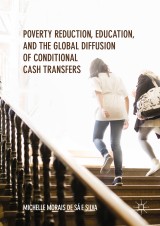Details

Poverty Reduction, Education, and the Global Diffusion of Conditional Cash Transfers
|
24,60 € |
|
| Verlag: | Palgrave Macmillan |
| Format: | |
| Veröffentl.: | 19.07.2017 |
| ISBN/EAN: | 9783319530949 |
| Sprache: | englisch |
Dieses eBook enthält ein Wasserzeichen.
Beschreibungen
This book explores Conditional Cash Transfers programs within the context of education policy over the past several decades. Conditional Cash Transfer programs (CCTs) provide cash to poor families upon the fulfillment of conditions related to the education and health of their children. Even though CCTs aim to improve educational attainment, it is not clear whether Departments or Ministries of Education have internalized CCTs into their own sets of policies and whether that has had an impact on the quality of education being offered to low income students. Equally intriguing is the question of how conditional cash transfer programs have been politically sustained in so many countries, some of them having existed for over ten years. In order to explore that, this book will build upon a comparative study of three programs across the Americas: Opportunity NYC, Subsidios Condicionados a la Asistencia Escolar (Bogota, Colombia), and Bolsa Famila (Brazil). The book presents a detailed and non-official account on the NYC and Bogota programs and will analyze CCTs from both a political and education policy perspective.
<p>Introduction<br></p><p>Part I. A Best Practice to Reduce Present and Future Poverty </p><p>Chapter 1. Conditional Cash Transfer Programs and the poverty-reduction agenda</p><p>Chapter 2. The International Diffusion of Conditional Cash Transfers</p><p>Chapter 3. Framing the Study of CCT cases</p><p>Part II. The Realities of CCTs in the Global North and the Global South</p><p>Chapter 4. A Conditional Cash Transfer in the Big Apple</p><p>Chapter 5. Money to Bear the Indirect Costs of Schooling</p><p>Chapter 6. The Largest Conditional Cash Transfer in the World.- Part III. What Have We Learned?</p>Chapter 7. Case comparison: CCTs’ divorce from education policy and long program lives <p></p><p>Chapter 8. Conclusion: What has the future got for this global model? </p>
<p>Michelle Morais de Sa e Silva is Wick Cary Assistant Professor of International and Area Studies at the Department of International and Area Studies, University of Oklahoma, USA. Previously, she held the position of Head of Graduate Programs and Professor at Brazil’s National School of Public Administration (Enap). Morais was also Coordinator General for International Cooperation at Brazil’s Ministry of Human Rights (2011-2014). Before that, she had been a UNESCO staff member for six years. Morais has worked in countries like Angola, Colombia, Mozambique and Russia, besides Brazil. Her research agenda has been mostly focused on issues of international cooperation for development, policy diffusion, and international comparative education. </p>
This book explores Conditional Cash Transfers programs within the context of education policy over the past several decades. Conditional Cash Transfer programs (CCTs) provide cash to poor families upon the fulfillment of conditions related to the education and health of their children. Even though CCTs aim to improve educational attainment, it is not clear whether Departments or Ministries of Education have internalized CCTs into their own sets of policies and whether that has had an impact on the quality of education being offered to low income students. Equally intriguing is the question of how conditional cash transfer programs have been politically sustained in so many countries, some of them having existed for over ten years. In order to explore that, this book will build upon a comparative study of three programs across the Americas: Opportunity NYC, Subsidios Condicionados a la Asistencia Escolar (Bogota, Colombia), and Bolsa Famila (Brazil). The book presents a detailed and non-official account on the NYC and Bogota programs and will analyze CCTs from both a political and education policy perspective.
<p>Goes beyond the traditional economics-based perspective on Conditional Cash Transfers and offers a policy based perspective</p><p>Addresses issues of political sustainability and policy coordination within the education field</p><p>Builds upon a comparative study of three CCT programs across the Americas</p><p>Includes supplementary material: sn.pub/extras</p>
<div>Goes beyond the traditional economics-based perspective on Conditional Cash Transfers and offers a policy based perspective</div><div><br></div><div>Addresses issues of political sustainability and policy coordination within the education field</div><div><br></div><div>Builds upon a comparative study of three CCT programs across the Americas </div><div><br></div><div><br></div><div><br></div>
"This book provides a fascinating account of the reception and translation of a global education policy. Conditional Cash Transfer programs have ‘traveled’ from one country to another, making us wonder why they have resonated and how they were translated in a given context. This well-written book fills this huge gap in comparative policy studies.” (Gita Steiner-Khamsi, Professor of Education and Chair of the Department of International and Transcultural Studies, Teacher’s College, Columbia University, USA)<p></p>
Diese Produkte könnten Sie auch interessieren:

Community Schools in Africa

von: Deborah Glassman, Chloe O'Gara, Kristin Helmore, Jordan Naidoo, Fred Wood

53,49 €















